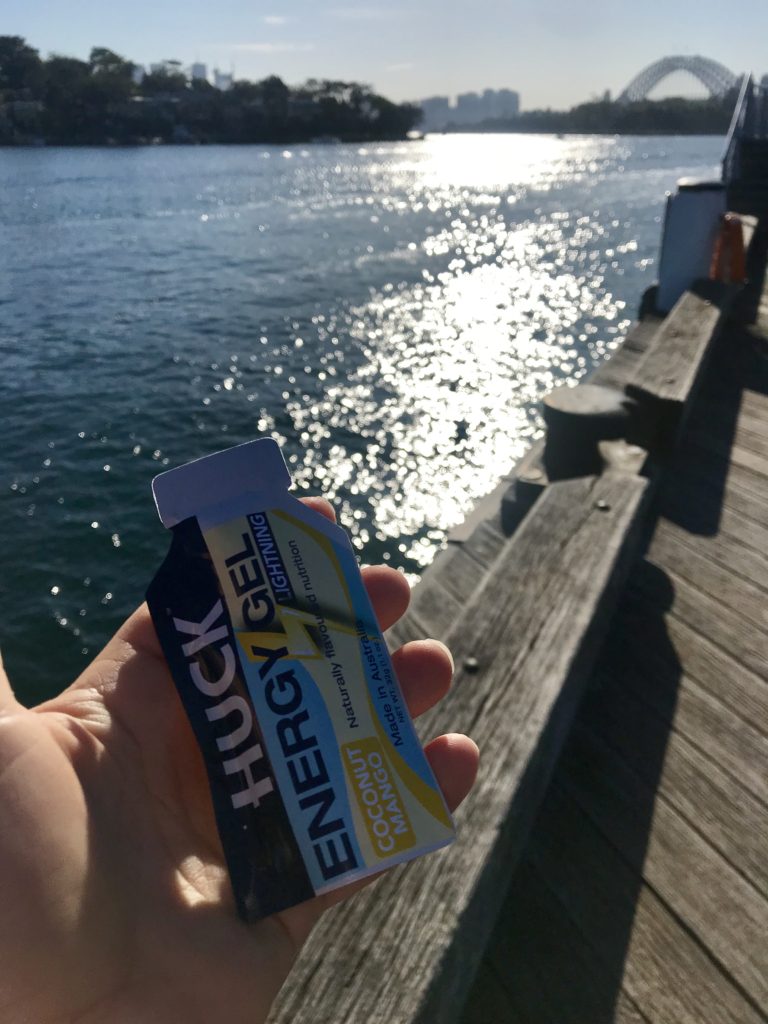
Written by Rachel Eagleton, Running Science’s Nutritionist. Find out more about Rachel here:
I love dropping into Running Science to buy new shoes because I always come away with something new to try! Last week, the owner Fletch gave me a few samples of a new product “Huck Energy Gel” to check out.
I immediately geeked out on the ingredients because I could see from the nutrition panel that these would be a good option for my clients with sensitive tummies needing a low FODMAP sports supplement*. Fletch just shrugged and said he liked the taste and consistency, which is equally important!
The ingredients in the Coconut Mango Energy Gel are Organic Rice Malt Syrup, Glucose Syrup, Natural Flavour, Citric Acid, Himalayan Pink Salt, Green Tea Extract (contains caffeine), Leucine, Isoleucine, Valine
The Huck website tells me that the products are all natural, vegan, gluten-free and non-GMO and made in Australia.
*Interestingly when I looked through the rest of the range I noticed some of the flavours (apple, orange, strawberry) were sweetened with agave and used fruit purees so these would not be considered low FODMAP. That doesn’t mean they won’t work for everyone, just that they wouldn’t be a good choice if you were sensitive to FODMAPs..
Leucine, valine and isoleucine are amino acids which are included in some energy gels because they might help reduce mental fatigue and reduce muscle damage. Just like a GU Gel or a Huma Gel there are 24g carbs and 100 calories in each Huck Gel.
WHAT DOES IT TASTE LIKE?
I set off on my run and tried the Mango Coconut Flavour about an hour into my run. I was worried it would be sickly sweet but it was a lot less sweet than tropical juice. It was very refreshing and would be a good option if you don’t like very sweet gels. The consistency was slightly thinner than a GU gel but not watery. I washed the gel down with water and definitely felt my energy levels pick up for the return leg home. Being Australian they are cheaper than some other gels on the market. As I think it’s really important for runners to practice their nutrition strategy when training for a half or full marathon the cost of gels can add up!
WHEN WOULD I NEED THIS PRODUCT?
If you are running or cycling for more than 75 minutes you will benefit from ingesting approximately 30-60 grams of carbohydrates every hour. This will maintain blood glucose levels to fuel your muscles and brain and help you avoid “hitting the wall”. You’ll also get more out of your training session as you will be able to sustain the intensity for longer.
I noticed that the only electrolyte in the Huck Gel was the himalyan pink salt so very sweaty runners may need additional electrolytes. In addition for prolonged endurance events at high intensities a range of “multiple transportable carbohydrates” are more effective than glucose-based products in maintaining gut comfort, promoting muscle carbohydrate oxidation and enhancing performance (see Jeukendrup, 2010) so I wouldn’t recommend Huck gels for very long efforts such as ironman training.
However, if your stomach doesn’t handle traditional gels or sports drinks you might find that certain flavours of the Huck Gels are gentler on your stomach.
Several of the the Huck Energy Gels contain caffeine, and caffeine is proven to reduce the perception of fatigue with the ideal dose being 1-3mg per kilo of bodyweight. . I emailed Huck and they have advised there is 20mg of caffeine in their caffeinated energy gels. So for a 60kg runner 3 of these gels (over an appropriate time of running) would provide a meaningful dose of caffeine. If you don’t react well to caffeine there are caffeine-free flavours.
Don’t forget to always consume your energy gel (regardless of brand) with water so that your body can process the gel. Experiment with different fuelling options before your event so you can find a solution that works for you – remember – nothing new on race day!
Are you training for an endurance event? Did you know that using a scientific approach to nutrition in a marathon takes, on average, nearly 11 minutes OFF an amateur runner’s finish time? My 8 week Endurance Nutrition program focuses on supporting your marathon training with making nutritious food choices a priority so that you can get to the start line feeling great. On race day you will be armed with well trialled strategies that work for you and will help you run your best fuelled marathon, half marathon or triathlon.
